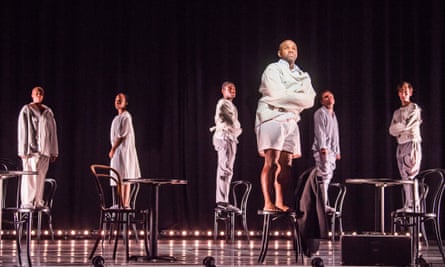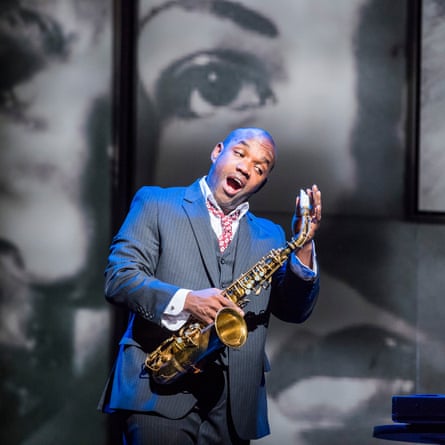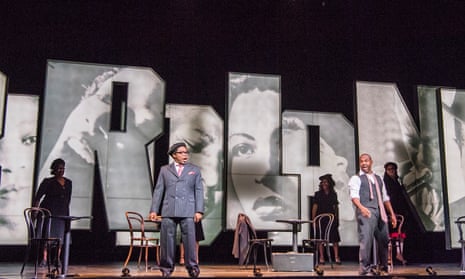Daniel Schnyder’s opera about the death and life of Charlie Parker was first performed in Philadelphia in 2015, then seen in Chicago and Harlem, before it transferred to London in this co-production between English National Opera and Hackney Empire. It was commissioned for the American tenor Lawrence Brownlee, a noted exponent of Italian bel canto repertory. Saxophonist-composer Schnyder, whose own work comfortably encompasses classical and jazz, was apparently struck by the similarities between Brownlee’s coloratura technique and the virtuosity of Parker’s playing: Charlie Parker’s Yardbird is essentially a classical-jazz fusion with antecedents in Gershwin and Weill, although the work it most immediately brings to mind is Ernst Krenek’s 1927 opera Jonny Spielt Auf, the protagonist of which is also a black American jazz bandsman.
Schnyder and his librettist, Bridgette Wimberley, tell Parker’s story in a sequence of oblique flashbacks, starting at the end. Parker, who admired Bartók and Stravinsky, had thoughts during his life of writing a classical-jazz fusion of his own. In Yardbird, while his body lies unidentified in a New York morgue, his ghost haunts the Birdland club named after him, obsessed with thoughts of his unwritten masterpiece. As he scribbles on sheets of music paper – presented as an awkward task for one whose art was rooted in improvisation – his past begins to confront him.
His patroness, Nica de Koenigswarter (Julie Miller), in whose room in a segregated hotel he died at the age of 34, calmly considers how to deal with the resulting scandal. We see his early life with his fretful mother, Addie (Angela Brown), and his put-upon first wife, Rebecca (Chrystal E Williams). Dizzy Gillespie (Will Liverman) appears to remind Parker of the bebop revolution the two of them forged. Wimberley explores his relationships with his loyal third wife, Doris (Elena Perroni), and his fourth wife, the glamorous Chan (Rachel Sterrenberg), and charts the breakdown that resulted in Parker’s incarceration in the Camarillo State Mental Hospital in California, although her treatment of how Parker’s heroin addiction affected his work is, at times, sketchy. Towards the close, as news of his death breaks and arguments erupt about where he should be buried, the ghost of Parker comes to recognise that his ultimate legacy is the impact of his playing, and his dreams of writing that elusive work must remain unfulfilled. “I know why the caged bird sings,” he tells us, quoting Paul Laurence Dunbar, as the final shadows fall round him.

Schnyder’s score is ambitiously beautiful. Bluesy rhythms, underpinned by Stravinskyan dissonance, propel us forward, while oscillating Bartókian nocturnes provide moments of pause. Brownlee sustains long, ecstatic vocal lines, the shapes of which cannily link jazz to bel canto, although he is given less bebop coloratura than one might expect. Parker’s dialogue with Gillespie has Rossinan wit and poise. “This land ain’t no place for a black man child, got dreams,” Brown and Williams muse in a sad, ravishing duet. Chan introduces both herself and her love for Parker’s playing in a big aria that winds back upon itself in ways reminiscent of Bellini, while Doris, confronted with Parker’s confinement at Camarillo, lets fly a haunting, wordless cadenza of grief that gets under your skin.
Yet for all its beauty and anger, there are flaws. The opera is predicated on prior knowledge of Parker’s work and acceptance of its greatness. “We love you, we hear you, we know your great mind,” the characters sing as they contemplate his corpse, briefly putting aside their individual claims on his life. Ironically, however, we don’t “hear” him – neither Schnyder nor Wimberley give us much indication as to what it was actually like to listen to Parker play, though Schnyder embeds fragments of Parker’s own music in the score as cell-like points of melodic or rhythmic departure. The final impression is of an archetypal narrative of a troubled artist who crashes and burns under social and personal pressure, but which ultimately withholds the true nature of his genius.

Directed with unobtrusive simplicity by Ron Daniels, and featuring an instrumental ensemble drawn from ENO’s orchestra persuasively conducted by Clark Rundell, it is, for the most part, superbly done. Brownlee gives a performance of remarkable vocal and dramatic integrity in a taxing central role that rarely takes him from the stage during the opera’s unbroken 90-minute span, and his singing has wonderful colour and ease. Perroni and Sterrenberg could do more with the words, although Sterrenberg is very seductive in Chan’s big aria and Perroni makes your spine tingle in that wordless lament. Brown’s duet with Williams is a high point.
For all its flaws, it compels respect and admiration, though to make full sense of it, revisit Parker’s own, breathtaking recordings before you hear it.

Comments (…)
Sign in or create your Guardian account to join the discussion